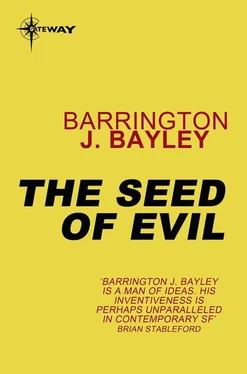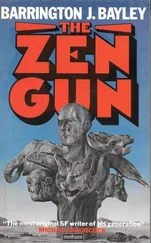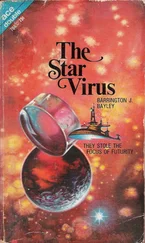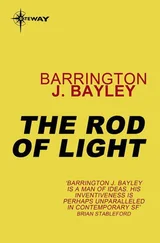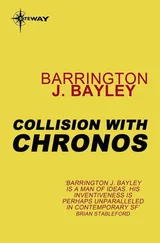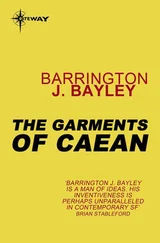We had no opportunity to argue further, for the decision was taken out of our hands. As the communicator bleeped the alarm call, all monitor screens came to life.
The detector crews had found a second species of intra-Earth intelligence approaching from a distance of some miles, and we had several minutes in which to prepare.
Their fleet came up from below and arrayed itself about us, while we took to our battle stations. They were long, portly craft which swayed slightly due to some invisible phenomenon of the depths, and they gathered slowly, as if getting our measure, closing in with a menacing air.
Then, either on general principle, or because they considered us enemies, they attacked.
I was exultant. Now the Interstice , previously untried in full-scale combat, would use her full capacity, and the temper of our expedition would crystallise, one way or the other. For these adversaries of ours were not the primitives of the higher levels. Their ships moved under their own power, and their weapons could do us damage.
Yet still they were not our technological equals. They fired flashing arrow-like projectiles which could penetrate our armour, and they skilfully deployed their large numbers in an attempt to compensate for our superior armament. But the Interstice bulked huge above them, bristling with torpedo tubes and seismo-beam turrets; we were a match for them.
It was a running fight. Power Section strained the propulsors to their utmost, and we pressed down like a whale surrounded by a cloud of sharks. Captain Joule gave up trying to evade the enemy missiles, and left our defence to the wicked power of Weapons Section.
When I entered the main body of the ship to keep a watch on the performance of our equipment, the galleries were booming like bells from enemy strikes, and shuddering from the explosions of our own torpedoes as they flashed out of polarisation and caused titanic convulsions in the Earth—I’ll warrant the subearthers never heard of that trick! I could hear the surging rush of their launching, and from the alcoves set high in the walls came the buzzing of seismo-beams.
Just ahead of me, a twenty-foot lance lunged through the side of the wall and hurtled aslant the spacious central well. A gunner fell from the wall, his head cleft open. The seismo-beamer he had been operating was a ruined mess.
Thirty times their projectiles broke our hull, and we lost eight men. But what of it? We were an invincible dreadnought. The Interstice was truly a battleship.
Eventually they withdrew, with heavy losses. Perhaps we had passed outside their domain.
There was a drumming of power tools as the crewmen applied themselves to repairs amid the fumes of our own weapons. I returned to the control cabin, where Captain Joule was checking Polariser, Weapons and Power Sections. He turned to me as I entered.
“Steering’s gone,” he said gloomily. “There’s no choice about what we do now. I wouldn’t like to try to turn the ship on the main drive; the polarisers would blow, no doubt about that.”
I made no answer. The Interstice , unable to turn aside without the elaborate gear necessary to change the direction of a polarised field, could do nothing but journey on, and on.
We had gained a victory, but lost control over our destiny. It was in this helpless mood that the officers of the Interstice directed her even deeper into the solid Earth.
For a month we sank down under the force of the motors. Every day I anxiously studied the instrument readings. In all that time, the nature of the external rock showed no change.
Everything, with the exception of the second mass-meter reading and the plain fact that we were moving downwards, indicated that we were still at rest ten miles below the surface.
Joule and I gave all our thought to the problem. Sometimes, he shuddered. Was this the bottomless gulf of which poets speak in terror?
“It’s impossible!” he said in exasperation. “Rock is flowing past us! Living creatures appear from ahead, and drop behind. Yet we are unable to approach the centre!”
We drew a circle to represent the Earth, and resolved the mystery to the fact that the mass-meter gave two conflicting positions for the Interstice within that circle. Or was it some radically new geometry, where two quantities no longer add up to their sum? What do we know of the universe? We only have experience of the surface of our planet—perhaps, elsewhere, laws are different.
Experimentally, we drew in quadrant of the circle, and contemplated the figure. Joule drew in concentric rings, and we noticed that in the quadrant, the arc shortened in proportion to the radius.
It was a subtle thought.
Apart from the philosophical considerations, I also wondered whether the gauss shunt, by draining surplus energy back to ground, was somehow the source of an illusion affecting all the external instruments and the mass-meter. I could think of only one way to find out.
Captain Joule regarded me with horror when I requested permission to turn off the shunt.
“If the conjecture is correct,” he said in a hushed tone, “we’ll be blown to kingdom come.”
“What of it?” I cried, gesturing wildly. “We can’t carry on like this. We could as well be journeying in Limbo. We might get away with it if the shunt is out of action for only a few milliseconds.”
We did the thing secretly. With my own hands I assembled the timing mechanism and connected it to the bank. For twenty milliseconds the shunt was inoperative.
The meters did not even flicker.
“Try again!” Joule ordered.
Three times I repeated the experiment. Then I turned off the shunt permanently. Never having encountered the conditions for which it was designed, it need never have been built at all.
“That leaves the other explanation,” Joule said, “The philosophical one. But it entails a relativity more staggering than any our physicists have thought of—”
I should have known that his calm, inexorable mind would have produced the answer eventually, But as he was about to explain, the third subsurface attack began.
They were a small, swift raiding force which swooped down on us from the north. We never knew where they came from: there were no signs of the habitations we had seen on higher levels. Most likely they were pirates, or warrior nomads, for they were professional, ferocious—and more deadly than anything we had yet encountered.
What was more, they had learned how to crack a polarised field.
Perhaps our own equipment was too strong for them, or perhaps they simply wished to frighten us into surrendering, but for only two brief intervals did we hear the ear-splitting shriek of their appliance, the groan of the polarisers and experience the suffocating heat of a wavering field. Then again, the depleted resources of Weapons Section were brought to bear.
This was the fight that broke us.
The raiders’ main aim was to board us. We had expended what remained of our torpedoes, and were resorting to the less effective seismo-beams, when they expertly blew a hole in the hull. In Command Section, Joule and myself heard alarmed cries and strange clattering sounds. A few minutes later came the explosion, deafening in the confined space. A crewman had heroically blasted the section through which the subearthers were pouring.
Thereafter, the fight inside the ship was brief; yet it lost us our leader.
Three raiders who had escaped the explosion came swimming along the central well, hurling destruction in every direction from powerful hand weapons, and within minutes they had arrived at Command Section. Never will I forget the look on Captain Joule’s face as he reached for his handgun. Nor can I describe it, for I saw every emotion there, each distinct, yet none dominant.
Читать дальше
